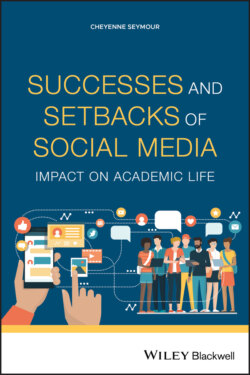Читать книгу Successes and Setbacks of Social Media - Группа авторов - Страница 17
Reflecting on This Course’s Role in My Academic Success
ОглавлениеLooking back on this experience, I can see the role it played in my learning and development as an undergraduate student. This class connected my interest in how individuals used social media with my academic coursework. It highlighted the issues of diversity, inclusion, and social justice that I was learning about in class and through my co-curricular activities. It provided an example of how social media could be used for civic engagement and was the foundation for my undergraduate thesis project, which allowed me to explore these ideas further. The experience of incorporating social media throughout the course kept me engaged in class, shifted my perspective on how social media was related to civic engagement, and shone a light on how other coursework connected to my experiences.
Using social media in class and to engage with the instructor contributed to my academic success. It gave me permission to use a form of communication that is often thought of as a disruption in the classroom. Throughout my college experience I was often told that technology, especially smartphones, was distracting and should not be used in the class even if I was using said technology to engage with relevant material. I found that when social media and technology were integrated into the course, I was less likely to use it when I was not supposed to and was more engaged. Coming into class, I knew that I did not necessarily need to look something up right away when listening to a mini lecture because shortly we would be doing an activity where I could use my phone or computer. Acknowledging technology and social media as a resource available to students ensured that these platforms were no longer distractions, but opportunities allowing me to further engage with course content.
The approach taken in this course kept me engaged as a student and challenged me to think about social media as a space for dialogue and deliberation. I often engaged with social media as a distant observer, regularly checking several platforms (e.g. Facebook, Twitter, Instagram), but rarely posting content of my own. Although this is still my general approach to engaging with social media, this course challenged me to think about its possibilities more broadly. Throughout the course, I was introduced to movements (e.g. the Arab Spring) that used social media to liberate citizens and communicate with the world. I now understand social media as platforms where folks can organize, where people can build community, and as a place for dialogue, and possibly deliberation. The application of theories of persuasion to a social media context allowed me to understand that when used intentionally, social media could be a place where citizens enact change. By engaging social media and technology and using them in different service-learning contexts, instructors could have the opportunity to inspire a change in students’ perspectives.
Framing the campaign around diversity, rather than simply applying theories of persuasion to social media, I began the process of thinking about platforms as possible sites for civic engagement and meaningful activism. Examples like #BlackLivesMatter, and later #MarchForOurLives, created discussions about the hashtag activism I saw people using on social media as a way to facilitate change on issues present in the communities I was in. Social media posts were generating in-person conversation, but I also wondered about the possibility of dialogic and deliberative conversation in online spaces. This connection spurred my academic success because these ideas became the foundation of my undergraduate honors thesis (Ashby-King and Hanasono 2018) where the findings were later published. When thinking about the transformative learning that occurred in the course for me, I wanted to see if this was happening for others. Although this example may not reflect every student’s experience, instructors can use it to consider how to connect their coursework to topics that will be meaningful for those enrolled. This could be done for semester-long work or for individual assignments where students are selecting their own topics. Connecting course material, civic engagement, service-learning, and students’ everyday experiences on and offline could provide the connections students need to promote their academic success.
Relating the material in this single class to my everyday life illuminated the possible application of what I was learning throughout my full college experience (curricular and co-curricular engagement). As a resident advisor and orientation leader, I was learning about diversity and inclusion as they related to working with my peers in the residence halls or welcoming them to campus. In the classroom, I was learning about crafting anti-hate messages that could be posted on social media. This provided the foundation for later reflection on how not only this coursework, but all of my coursework, could connect to my jobs, involvements, and interests outside of the classroom. If instructors can help students draw these connections, social media is an avenue to do this because it is central to the lives of most Generation Z students and has the possibility of enhancing student learning and academic success.
